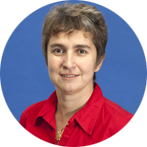
Nuclear Magnetic Resonance (NMR)
Contacts
Staff
Faculty Scientific Advisers

Andrei Alexandrescu, Ph.D.
Professor
- Biology Physics Building 209
- andrei.alexandrescu@uconn.edu
- 860.486.4414

Olga Vinogradova, Ph.D.
Associate Professor
- School of Pharmacy Room 632
- olga.vinogradova@uconn.edu
- 860.486.2972

Location
Campus Address
Varian INOVA 600:
Chemistry Building, Room R002
Bruker Avance 500:
Pharmacy Biology Building, Room 056
Mailing Address
Varian INOVA 600:
55 North Eagleville Road, Unit 3060
Storrs, CT 06269
Bruker Avance 500:
69 North Eagleville Road, Unit 3149
Storrs, CT 06269
Instrumentation

Varian INOVA 600
Fitted with a triple-resonance (1H, 13C, 15N) inverse cryogenic probe, the Varian 600 has a superior proton sensitivity (signal-to-noise ratio ~4500). Owing to a high proton sensitivity, the 600 is an instrument of choice for characterization of submicrogram quantities of soluble organic compounds and the natural products via the proton-detected experiments: 1H one-dimensional spectra, 1H-1H, 1H-13C, and 1H-15N two-dimensional correlation spectra (COSY, TOCSY, NOESY, HSQC, HMBC, etc). The spectrometer is also fully equipped to carry out the biomolecular multidimensional (3D, 4D) NMR experiments and Diffusion Ordered Spectroscopy (DOSY) experiments. The Varian 600 can be found in the Chemistry Building, room R002.

Bruker AVANCE 500
This walk-up spectrometer is equipped with the broadband 5 mm BBFO SmartProbe that can automatically select, optimally tune, and match with the auto tune-match (ATM) component to any nuclei in the resonance frequency range between 15N-31P. Besides, this BBFO probe has the added ability to observe 19F with 1H decoupling and vice-versa, as well as to perform 1H-19F 2D correlation spectroscopy. The probe has a signal-to-noise ratio 730 for 1H, 550 for 19F, 300 for 13C, 180 for 31P and 40 for 15N. The Bruker AVANCE 500 is an instrument of choice for users with small quantities of a compound and for multidimensional experiments such as HSQC, HMBC or NOESY. It is used when a higher resolution NMR is necessary for chemical structure elucidation and it supports NMR studies on proteins and nucleic acids. The spectrometer is located in the Pharmacy/Biology Building, room 056.
The Department of Chemistry also houses the solution-state Bruker AVANCE III 400 MHz equipped with the two-channel console and a 5mm BBFO probe with 19F capability, and the Bruker AVANCE 300 MHz fitted with a 5mm BBO probe, both instruments have the ATM component.
Services & Rates

- The solution-state 500 and 600 MHz NMR instruments are offered on a fee-for-use 24/7 basis.
- The staff provides training and consultation on the use of the instruments.
- The staff provides expertise on the experiment planning and data analysis.
- The dedicated Network Attached Storage for NMR data transfer and archive is available.
- The instruments' time and other services can be reserved at https://cider.uconn.edu/facilities/NMR. This webpage also provides additional details about the NMR Facility.
Training and Education
Only trained users can be granted access to the NMR spectrometers. The NMR Facility Staff provides training and consultation in the use of instruments under their respective supervision. A 24 hour notice is required for scheduling a hands-on training session. For specific questions regarding NMR applications and for general managerial questions, please contact the NMR Facility Director.
Research Potential
The NMR Facility directly supports and impacts research programs in the following areas:
- Chemical synthesis
- Analysis of Chemical Mixtures
- Pharmaceutical chemistry
- Molecular recognition & drug binding
- Nanomaterials
- Macromolecules
- Protein structure-function relationships
- Protein folding and design
- Nucleic acid structure and reactivity
- Molecular dynamics
The provided instruments are used for a wide range of problems. The most frequent involve monitoring the chemical synthesis, drug discovery and development, material science, the molecular structure determination and ligand-protein interactions. The instruments are capable of carrying out molecular diffusion measurments, identifying metabolites in mixtures, and following reaction kinetics, just to cite a few examples.
